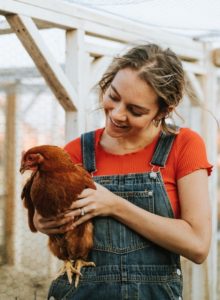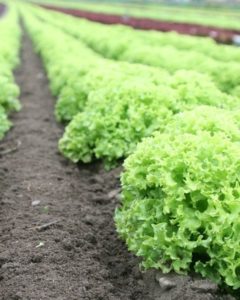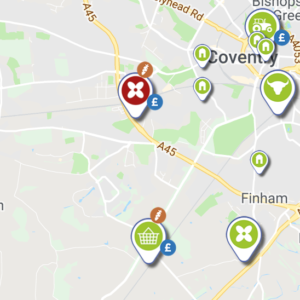What to do in your organic veg patch in June

Do you grow organically, or want to try? Here is a great resource to help you grow great fruit and veg at home from our friends at Garden Organic. Like BigBarn Garden Organic work with schools to get kids growing veg and they are supporting our petition to get Food Growing on the national curriculum (please sign here).
So here is what they are suggesting to do in June:
Early summer in the organic garden is full of colourful new growth. This makes a busy – but lovely – month in the garden.
Remember the two organic principles: good soil management, and diverse planting to encourage plenty of beneficial wildlife. And keep on top of the weeds!
See below for advice on soil, vegetables, fruit, and herbs. Also What to Sow and Plant in June and vegetable growing cards for advice.
Where you see the sign FS, Garden Organic members can check the relevant Fact Sheet for further information.

Soil matters
Add a mulch on any bare, moist soil, using compost. Organic mulches keep soil moist, and deter weed growth (remove weeds before mulching). Mulches provide a safe habitat for all sorts of beneficial creatures, such as centipedes and beetles that devour slugs and other pests. And the compost provides a constant source of nutrients.
Keep adding to your compost bin, making sure to mix ‘greens’ (lawn cuttings etc), with ‘browns’ (cardboard, straw and scrumpled up paper). Turn the heap to aerate it, add water if it feels dry and dusty. See Home Composting
See Managing your soil and FS Managing your soil
Vegetables
If your first sowings and plantings have failed or are unhealthy there is still time to sow some more. Soil will have warmed up and direct sowings should be more successful.
Hoe off weeds before they flower/set seed. Seedlings can be left to shrivel and die on the soil surface. Put larger ones in the compost heap (without seed heads.)
Harvest comfrey leaves to make your own liquid feed for tomatoes and other container grown plants.
Fill any empty gaps still awaiting vegetables with a fast-growing cover crop of green manures. Buckwheat, mustard, phacelia or trefoil can all still be sown if the ground is moist enough. See Green Manures or FS Green Manures.
Squish heavy infestations of aphids on fresh plant shoots with your fingers (wear rubber gloves if squeamish). Avoid sprays – as birds, wasps and other beneficial creatures are feeding their young. Unless a wasp nest is in a really inconvenient and potentially dangerous location, it need not be destroyed.
Pest and Disease Watch
Grow plenty of predator-attracting flowers, to bring in the beneficial creatures such as parasitic wasps, ladybirds and hoverflies. See also: Organic Gardening Guidelines on best practice for biodiversity.

Fresh chemical free lettuce
Caterpillars
Use fleece or fine mesh to protect brassicas against caterpillars, particularly the colonies of large cabbage white butterflies.
Also against leek moth and allium leaf mining fly. See Pests and Diseases for treatment, or FS Leek moth and Allium leaf miner.
Cut chard regularly to protect it from the leaf miner (a tiny fly that lays its eggs on the underside of the leaves, creating brown blotches).
Pull up and compost courgette plants suffering from cucumber virus. Their leaves are stunted, fruits are small, and the plants will not recover. There is still time to sow a variety, such as Defender, that has some resistance to this disease.
Tomato leaves may turn yellow, curl up, go purple underneath, develop brown patches or other oddities. This is not disastrous, it’s due to fluctuations in day and night temperatures. Keep plants watered consistently to avoid blossom end rot. This is particularly important for tomatoes growing in pots and grow-bags. Use a liquid comfrey feed once the first truss has set.

Fruit
Apply a seaweed-extract foliar spray which contains natural growth stimulants and a variety of trace elements. Besides improving the quality of your fruit, the plants become stronger and healthier so are less susceptible to pest and disease attack. Available from The Organic Gardening Catalogue.
Water newly planted fruit trees/bushes, and keep a weed-free area around their bases to reduce competition for water and nutrients.
Most top fruit and soft fruit will benefit from some pruning and fruit thinning. For more information on specific crops refer to our Fruit Growing
Herbs
There is still time to sow and grow your own organic herbs, such as borage, chives, fennel, summer and winter savoury.

Your Local Food Map?
Mint rust (orange blobs on leaves and stems) can continue from year to year. Remove and destroy plants and start again with new stock. Chive rust is less serious and temporary. Cut plants back to stumps; fresh clean growth will re-grow rapidly.
This is direct from Garden Organic’s website and has some great tips every month. We will continue to quote and expand on their input next month. As the Brexit squabbles continue we all need to get growing food?
Many of our readers go on to grow their own crops, but often rather more than they really need for themselves. Please look out for places to sell your excess produce through our Crop for the Shop scheme here.
You will find places on our Local Food Map that have opted in with a carrot flag on their icon. You could even approach your local shop, pub or restaurant and supply them with fresh produce in return for a pint of beer or meal.
And please advise them to join our map if they do opt in.